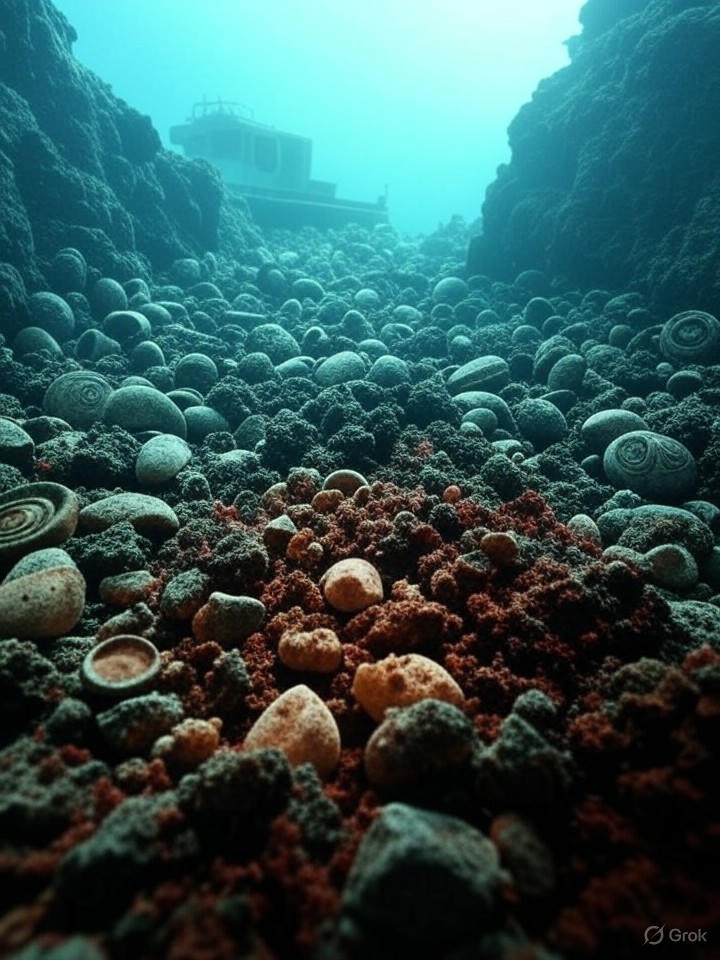Science
Ocean Technology Unveils Secrets That Redefine History

In recent years, advancements in ocean technology have led to significant discoveries that challenge established historical narratives. Exploratory missions utilizing sophisticated tools such as autonomous underwater vehicles (AUVs) and advanced sonar systems are uncovering artifacts and geological formations that rewrite timelines of human civilization and Earth’s geological history. Notably, the National Oceanic and Atmospheric Administration (NOAA) has been at the forefront of this exploration, employing remotely operated vehicles (ROVs) to investigate cold seeps in the Aleutian Arc, revealing ecosystems that indicate ancient environmental shifts.
Geological Insights from the Deep
A groundbreaking study published in August 2025 has provided fresh insights into the formation of the Atlantic Ocean. Researchers discovered massive mud wave formations beneath the seabed, estimated to be around 117 million years old. This finding suggests a more dynamic and violent origin for the ocean basin than previously understood. According to The Times of India, these insights were made possible through deep-sea drilling and seismic imaging techniques, highlighting the role of ancient sediment flows in shaping the ocean floor during the Cretaceous period.
Technological innovations have played a crucial role in these discoveries. A March 2024 article in Astrobiology emphasized the effectiveness of inertial measurement units (IMUs) paired with novel algorithms that enhance underwater navigation capabilities. This technology allows for the precise mapping of subsea terrains, enabling researchers to uncover features that may alter established geological history.
Unearthing Human History
The advancements in ocean exploration have also illuminated aspects of human history through the discovery of shipwrecks. In 2025, the Ocean Exploration Trust announced its expeditions using the E/V Nautilus, equipped with state-of-the-art mapping sonars and ROVs, to survey unexplored areas of the Western Pacific. These missions have led to the identification of World War II-era wrecks in the Gulf of Mexico, offering new insights into wartime strategies and losses, as reported in Ocean News & Technology.
Social media platforms have seen users sharing their excitement regarding these underwater discoveries, reminiscent of the 1985 Titanic find. Advanced sonar and camera-equipped vehicles like Argo have transformed the wreck-hunting landscape. The current generation of autonomous robots is extending this legacy by locating vessels from earlier eras, including potential colonial-era ships off the coast of Puerto Rico.
Recent expeditions have also uncovered vast freshwater aquifers hidden beneath ocean floors. A U.S. government expedition nearly 50 years ago, originally focused on mineral exploration off Cape Cod, inadvertently discovered what is now recognized as a massive aquifer extending from New Jersey to Maine. Modern drilling technologies have mapped this resource, which has implications for our understanding of ancient hydrological cycles and current water scarcity issues. As noted by Applied Technology Review APAC, these aquifers, detected through advanced seismic profiling, challenge assumptions regarding ocean salinity and land-sea interactions over millennia.
The Future of Ocean Exploration
The convergence of artificial intelligence with underwater research is propelling these discoveries into uncharted territories. A piece published in Aerospace & Defense Review in February 2025 highlighted how AUVs and gliders are currently monitoring deep-sea environments in real time. These technologies are revealing microbial life forms that date back 100 million years, as confirmed by laboratory studies shared on social media.
This technological evolution is not just an academic pursuit; it is reshaping various industries. Offshore energy firms are increasingly adopting these tools for safer exploration practices, as emphasized in a World Oil magazine article from August 2025. This increasing focus on safety aligns with the ongoing global transition towards sustainable energy sources.
Nevertheless, the rapid advancement of technologies such as deep-sea submarines and satellite-linked mapping raises ethical questions regarding exploration and preservation. NOAA’s 2025 Explorer-in-Training program, announced in April, aims to prepare the next generation of ocean explorers in responsible practices, ensuring that the process of rewriting history does not come at the expense of its preservation.
Industry experts stress the importance of funding for these initiatives; NOAA’s $5 million grants for fiscal year 2023, allocated for projects off the coasts of Alaska and California, are critical for developing tools that detect hydrothermal vents and ancient seeps. These initiatives provide vital clues regarding Earth’s abiogenic petroleum origins in deepwater rift valleys.
Ultimately, the ongoing exploration of ocean depths is forging a multidisciplinary frontier where technology intersects with history. Each discovery, from the Mid-Atlantic Ridge’s vents to the cold seeps of the Pacific, reveals layers of time that have yet to be understood. With only 5% of the ocean explored, as noted by National Geographic education resources, the potential for further revelations remains vast. Those involved in these expeditions recognize that embracing these technologies is key not just to uncovering the past, but also to informing sustainable futures, from climate modeling to resource management. As exploration efforts continue into 2025 and beyond, the ocean’s depths promise to redefine our collective understanding of history.
-

 Lifestyle3 months ago
Lifestyle3 months agoLibraries Challenge Rising E-Book Costs Amid Growing Demand
-

 Sports3 months ago
Sports3 months agoTyreek Hill Responds to Tua Tagovailoa’s Comments on Team Dynamics
-

 Sports3 months ago
Sports3 months agoLiverpool Secures Agreement to Sign Young Striker Will Wright
-

 Lifestyle3 months ago
Lifestyle3 months agoSave Your Split Tomatoes: Expert Tips for Gardeners
-

 Lifestyle3 months ago
Lifestyle3 months agoPrincess Beatrice’s Daughter Athena Joins Siblings at London Parade
-

 World3 months ago
World3 months agoWinter Storms Lash New South Wales with Snow, Flood Risks
-

 Science3 months ago
Science3 months agoTrump Administration Moves to Repeal Key Climate Regulation
-

 Science2 months ago
Science2 months agoSan Francisco Hosts Unique Contest to Identify “Performative Males”
-

 Business3 months ago
Business3 months agoSoFi Technologies Shares Slip 2% Following Insider Stock Sale
-

 Science3 months ago
Science3 months agoNew Tool Reveals Link Between Horse Coat Condition and Parasites
-

 Sports3 months ago
Sports3 months agoElon Musk Sculpture Travels From Utah to Yosemite National Park
-

 Science3 months ago
Science3 months agoNew Study Confirms Humans Transported Stonehenge Bluestones









